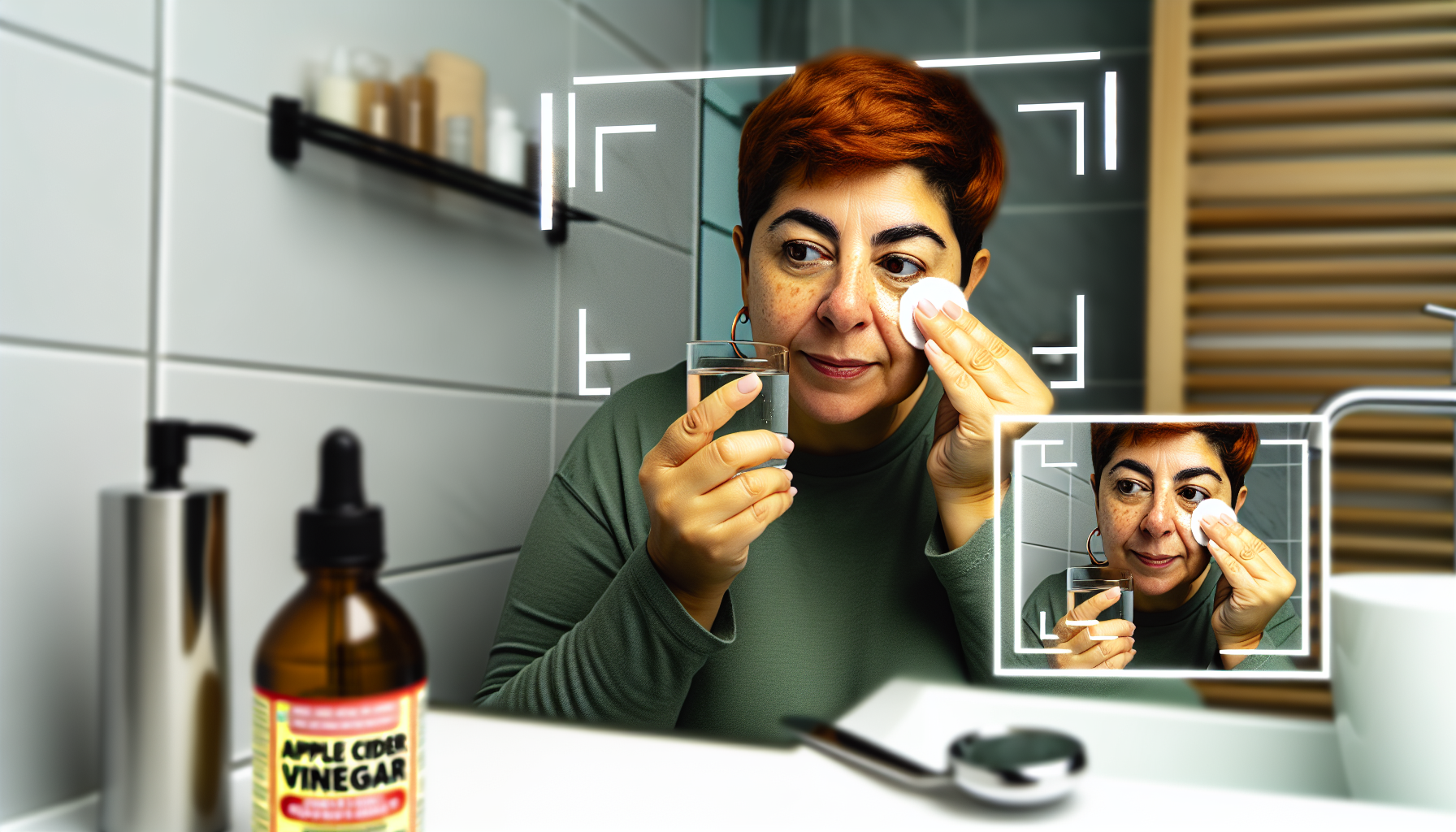Apple cider vinegar, a simple concoction of crushed apples, yeast, and sugar, has become a staple in many kitchen pantries. But is it a simple cooking ingredient or a miraculous elixir? Let's unlock the power of apple cider vinegar and discover the truth behind the myths.
Key Takeaways
-
Apple Cider Vinegar may have numerous potential health benefits but should be consumed safely and cautiously.
-
Diluting with 1 part vinegar to 2 parts water is recommended for safe consumption.
-
Apple cider vinegar does not cure serious conditions such as diabetes or cancer. Consulting a healthcare professional is advised before incorporating it into one's routine.
Exploring the Health Benefits of Apple Cider Vinegar

Apple cider vinegar, often called A.C.V., has been consumed for generations for its purported health benefits, ranging from aiding digestion to offering antimicrobial effects. Although popular, many of these claims are founded on anecdotal evidence and limited scientific studies. Therefore, further research is required to substantiate these potential health benefits.
Apple cider vinegar's potential health benefits are believed to stem from its main active component, acetic acid. This acid is said to have various beneficial effects, including lowering blood sugar levels, aiding weight management, and offering antimicrobial properties.
However, like a coin with two sides, apple cider vinegar has its potential downfalls, too - especially when consumed undiluted. We will further investigate these potential benefits and the proper methods of consuming apple cider vinegar.
Lowering Blood Sugar Levels
One potential benefit of apple cider vinegar intake is its potential role in blood sugar management. Studies suggest apple cider vinegar may enhance glucose and insulin levels following carbohydrate-rich meals. This could benefit individuals with type 2 diabetes, as incorporating apple cider vinegar into their diet may reduce fasting blood glucose levels.
However, like a tightrope walker who needs balance, using apple cider vinegar to lower blood sugar must be cautiously approached. It is not a substitute for prescribed diabetes medications. Consulting a healthcare provider before incorporating it into your diet is crucial to avoid health risks.

Aiding Weight Management
Another potential benefit of apple cider vinegar is its role in weight management. Some research suggests that drinking apple cider vinegar may promote feelings of fullness, decrease caloric intake, and contribute to weight management.
However, the research supporting the effectiveness of apple cider vinegar for weight loss is limited and inconclusive. Just as a single swallow does not make a summer, apple cider vinegar alone may not lead to significant weight loss. Embracing a balanced diet and regular physical activity is a comprehensive and effective approach to weight loss.
Antimicrobial Effects
Another proposed health benefit of apple cider vinegar worth highlighting is its antimicrobial properties. Apple cider vinegar has been shown to inhibit the growth of certain bacteria and fungi. This suggests that apple cider vinegar could be considered a natural antimicrobial agent.
However, it's important to note that the concentration of apple cider vinegar necessary to combat these microorganisms can vary. Just as you wouldn't use a sledgehammer to crack a nut, using apple cider vinegar in high concentrations could cause harm. Hence, using it in the right dilution is vital for safety.
The Correct Way to Consume Apple Cider Vinegar

Although apple cider vinegar may offer potential health benefits, proper consumption is critical. Consuming apple cider vinegar is not as straightforward as drinking apple juice. Its high acidity mandates dilution before consumption to prevent tooth enamel erosion or digestive tract irritation.
We will consider the safest methods to consume apple cider vinegar, including dilution before swallowing and incorporation into meals. Remember, apple cider vinegar is not a magic potion, and consuming it excessively can lead to adverse effects.
Diluting Apple Cider Vinegar
Like you wouldn't drink seawater due to its high salt content, consuming undiluted apple cider vinegar due to its high acidity is not advised. To safeguard the teeth and oesophagus from potential harm, apple cider vinegar should be diluted before consumption.
The general recommendation is to use a ratio of 1 part apple cider vinegar good, to 2 parts water for dilution. While you can dilute it with other liquids, water is typically the best choice. Apple cider vinegar remains as beneficial for health even when diluted. Its concentration does not affect its curing qualities. Think of it as a strong coffee; you might add water to make it more palatable, but the caffeine – the key ingredient – is still there.
Incorporating into Meals
Incorporating apple cider vinegar into meals is another excellent way to enjoy its potential health benefits. It's similar to adding spices to a dish; you enhance the flavour and reap the health benefits.
Apple cider vinegar can be used in a variety of recipes, including:
Salad dressings
Marinades for meat
Add apple cider vinegar to a glass of water
Incorporating it into your morning smoothie
Apple cider vinegar is suitable for various culinary purposes, including apple cider vinegar shots made from crushed apples
Taking apple cider vinegar as a daily supplement
The recommended daily amount for use in cooking is usually no more than 1 to 2 tablespoons. However, remember to seek advice from a healthcare professional before making significant dietary modifications.
Potential Risks and Side Effects of Apple Cider Vinegar

Despite the potential benefits of apple cider vinegar, it's crucial to be aware of its potential risks and side effects. Just as a rose has thorns, apple cider vinegar also has its potential downsides. These include possible acid reflux and interactions with certain medications.
We will further investigate these potential risks. Being aware of these potential side effects can assist you in making an informed decision about incorporating apple cider vinegar into your routine.
Acid Reflux Concerns
One potential risk of consuming apple cider vinegar is worsening acid reflux symptoms. This is because the acidic nature of apple cider vinegar can irritate the oesophagus, potentially worsening symptoms of acid reflux.
To prevent this, consuming diluted apple cider vinegar and avoiding sipping it throughout the day is recommended. Also, individuals with a history of stomach aches should exercise caution, as consuming apple cider vinegar on an empty stomach may result in discomfort.
Impact on Potassium Levels and Medication
Another potential risk of consuming apple cider vinegar is its impact on potassium levels and medication. Apple cider vinegar may interact with certain medications, particularly diuretic medications, causing decreased potassium levels in the body.
Individuals with low potassium levels should exercise caution when consuming apple cider vinegar. Too much of anything is bad; the same goes for apple cider vinegar. It's always advisable to consult a healthcare professional before significantly changing your diet or medication regimen.
Topical Uses of Apple Cider Vinegar

Besides its potential internal health benefits, apple cider vinegar is known for its possible topical uses. Like aloe vera gel for sunburn, apple cider vinegar has been used in various skin and hair care routines, such as:
-
Treating acne
-
Balancing the pH of the skin
-
Removing dandruff
-
Conditioning the hair
-
Soothing sunburns
However, using apple cider vinegar topically also requires caution. While it may relieve certain skin conditions, it can also cause irritation or chemical burns, especially when undiluted. We will further explore these potential benefits and precautions.
Improving Skin Barrier Integrity
Some suggest that adding apple cider vinegar could potentially improve skin barrier integrity. The idea is that being slightly acidic, like the skin's natural pH, apple cider vinegar could help stabilize the skin's pH levels when applied topically.
However, a recent study showed that soaking eczema-affected skin in diluted apple cider vinegar did not affect skin barrier integrity. It caused mild skin irritation in most participants. So, while apple cider vinegar might help restore your skin's natural pH, it is not a cure-all for skin conditions.

Apple Cider Vinegar Soaks
Apple cider vinegar soaks are another popular home remedy for various skin conditions. The key is diluting the vinegar properly to prevent skin irritation.
However, as with any home remedy, it's important to test your skin for sensitivity before using apple cider vinegar topically. As you wouldn't dive into a pool without checking its depth, you should conduct a spot test before applying apple cider vinegar to your skin.
Myth-Busting: What Apple Cider Vinegar Can't Do
Having explored apple cider vinegar's potential benefits and risks, we can now debunk some myths. Apple cider vinegar is not a miracle cure like any other food or supplement. It may offer some health benefits, but these should not be exaggerated or relied upon as a sole treatment for any condition.
We will debunk two common myths: the notion that apple cider vinegar can cure diabetes and cancer. Both these claims are false, and relying on apple cider vinegar as a primary treatment for these serious health conditions can have dangerous consequences.
No Miracle Cure
While apple cider vinegar may have potential health benefits, it is not a miracle cure for all ailments. Just as a knight's armour can't protect him from every blow, apple cider vinegar can't cure every health issue.
For instance, there's no evidence to suggest that apple cider vinegar can cure cancer or chronic kidney diseases. Relying on medically verified treatments for these serious conditions is crucial, and you should always consult a healthcare professional before incorporating apple cider vinegar into your routine.

Order Braggs for Nationwide Delivery with The Good Stuff
If you're interested in trying apple cider vinegar, one famous brand is Braggs. This brand is known for its organic, unfiltered apple cider vinegar, made from organically grown apples and contains the "mother," a mixture of natural bacteria and beneficial yeast and bacteria.
You can order Braggs apple cider vinegar for nationwide delivery from various online retailers. However, remember to consume it in moderation and as part of a balanced and healthy diet only. After all, even the sun, with all its benefits, can be harmful if one is overexposed to it.
Summary
In conclusion, apple cider vinegar offers a range of potential benefits, from aiding in blood sugar management body weight, to providing antimicrobial properties. However, it's not a miracle cure. Consuming it in moderation and as part of a balanced diet and regular exercise is the key to reaping these potential benefits. Also, remember that it's crucial to consult a healthcare professional before significantly changing your diet or health routine.
Frequently Asked Questions
What happens if I drink apple cider vinegar every day?
If consumed in moderation, drinking apple cider vinegar daily can benefit your health. However, drinking excessive amounts of A.C.V. can cause adverse side effects, such as slowed digestion, nausea, and erosion of tooth enamel, and may also interact with certain medications.
Does apple cider vinegar reduce belly fat?
Multiple studies have suggested that apple cider vinegar may help reduce belly fat, increase fat-burning genes and suppress fat storage in the liver and belly. Evidence suggests it may also aid weight loss by boosting metabolism and decreasing appetite, but further research is needed to support these claims.
Why drink apple cider vinegar in the morning?
Drinking apple cider vinegar in the morning can help kill bacteria which cause bad breath and provide a 'detoxifying' effect on the digestive system.
When should you drink apple cider vinegar?
It is recommended to drink apple cider vinegar before meals, diluted in lukewarm or room temperature water on an empty stomach, as it can stimulate digestion and regulate blood sugar levels. However, avoid drinking A.C.V. right after a meal, as it may delay digestion. Additionally, do not sniff the A.C.V., as it may cause a burning sensation in the lungs.
What does A.C.V. do to your body?
Apple Cider Vinegar has numerous health benefits, such as improving digestion, boosting immunity, and detoxifying the body.

